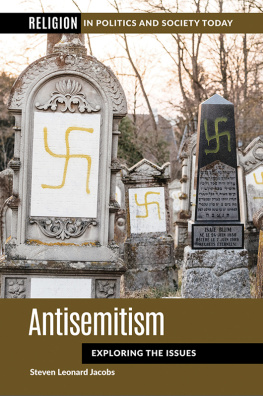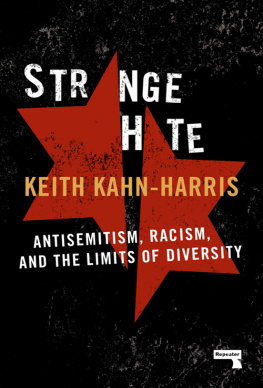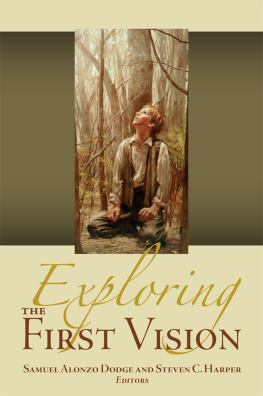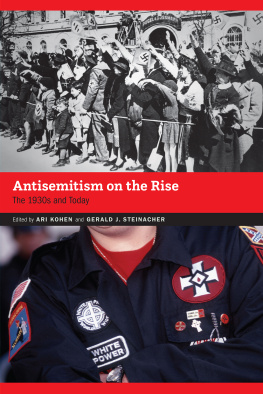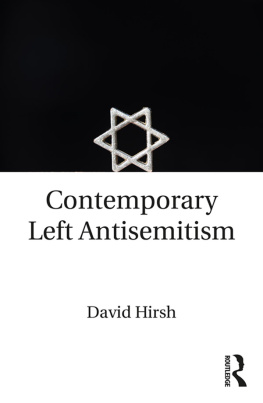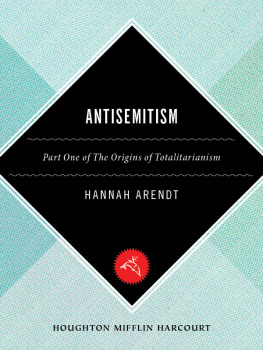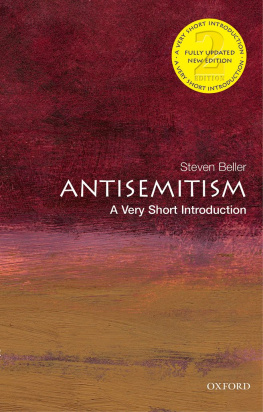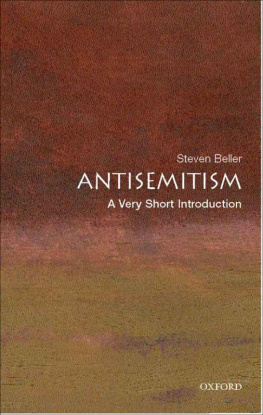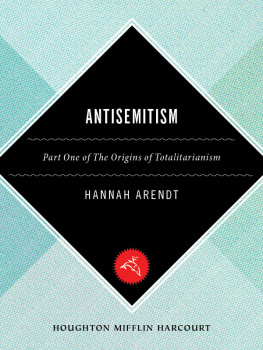Steven Leonard Jacobs - Antisemitism: Exploring the Issues
Here you can read online Steven Leonard Jacobs - Antisemitism: Exploring the Issues full text of the book (entire story) in english for free. Download pdf and epub, get meaning, cover and reviews about this ebook. year: 2020, publisher: ABC-CLIO, genre: Politics. Description of the work, (preface) as well as reviews are available. Best literature library LitArk.com created for fans of good reading and offers a wide selection of genres:
Romance novel
Science fiction
Adventure
Detective
Science
History
Home and family
Prose
Art
Politics
Computer
Non-fiction
Religion
Business
Children
Humor
Choose a favorite category and find really read worthwhile books. Enjoy immersion in the world of imagination, feel the emotions of the characters or learn something new for yourself, make an fascinating discovery.
- Book:Antisemitism: Exploring the Issues
- Author:
- Publisher:ABC-CLIO
- Genre:
- Year:2020
- Rating:4 / 5
- Favourites:Add to favourites
- Your mark:
- 80
- 1
- 2
- 3
- 4
- 5
Antisemitism: Exploring the Issues: summary, description and annotation
We offer to read an annotation, description, summary or preface (depends on what the author of the book "Antisemitism: Exploring the Issues" wrote himself). If you haven't found the necessary information about the book — write in the comments, we will try to find it.
Antisemitism: Exploring the Issues — read online for free the complete book (whole text) full work
Below is the text of the book, divided by pages. System saving the place of the last page read, allows you to conveniently read the book "Antisemitism: Exploring the Issues" online for free, without having to search again every time where you left off. Put a bookmark, and you can go to the page where you finished reading at any time.
Font size:
Interval:
Bookmark:
Adversus Judaeos
al-Banna, Hassan
al-Husseini, Amin
Alt-Right
Barnes, Harry Elmer
BDS (Boycott, Divestment, Sanctions) Movement
Beilis Affair
Blood Libel
Carto, Willis
Christian Identity
Coughlin, Charles E.
Crusades
Deicide
Dreyfus Affair
Duke, David
Farhud
Farrakhan, Louis
Fascism
Faurisson, Robert
Frank Trial and Lynching
Goldstein, Baruch
Holocaust
Holocaust, Denial of
Icke, David
Intersectionality
Irving, David
Kristallnacht
Ku Klux Klan
Luther, Martin
Marr, Wilhelm
Martyrdom, Sanctifying the Name of God
National Socialism/Nazism
Nationalism
Oberammergau Passion Play
Pierce, William Luther
Pius XII, Pope
Protocols of the Learned Elders of Zion
Proud Boys
Qutb, Sayyid
Rassinier, Paul
Rockwell, George Lincoln
Social Darwinism
Spanish Inquisition
Usury
Wagner, Richard
White Supremacy
World Church of the Creator
Yockey, Francis Parker
About the Author
STEVEN LEONARD JACOBS returned to the Department of Religious Studies as an associate professor and the Aaron Aronov Chair of Judaic Studies on January 1, 2001, and received tenure as of August 2004. He was promoted to full professor as of August 2017. He received his BA from Penn State University and his BHL, MAHL, DHL, DD, and rabbinic ordination from the Hebrew Union CollegeJewish Institute of Religion. As a resident of Alabama for four decades, he taught at Spring Hill College in Mobile; the University of Alabama at Birmingham, Birmingham-Southern College, and Samford University in Birmingham; and the University of Alabama in Huntsville and Calhoun Community College in Huntsville. He also served congregations in Birmingham, Mobile, Huntsville, and Tuscaloosa, Alabama, and in Dallas, Texas.
Dr. Jacobss primary research foci are in biblical studies, translation and interpretation, including the Dead Sea Scrolls; Jewish-Christian relations; and Holocaust and genocide studies. His books include Shirot Bialik: A New and Annotated Translation of Chaim Nachman Bialiks Epic Poems (1987); Raphael Lemkins Thoughts on Nazi Genocide: Not Guilty? (1992); Contemporary Christian and Contemporary Jewish Religious Responses to the Shoah (2 volumes, 1993, editor); Rethinking Jewish Faith: The Child of a Survivor Responds (1994); The Meaning of Persons and Things Jewish: Contemporary Explorations and Interpretations (1996); The Holocaust Now: Contemporary Christian and Jewish Thought (1997, editor); The Encyclopedia of Genocide (2 volumes, 2000, associate editor); Pioneers of Genocide Studies (2002, coeditor); The Biblical Masorah and the Temple Scroll: An Orthographical Inquiry (2002); Dismantling the Big Lie: The Protocols of the Elders of Zion (2003, coauthor); Post-Shoah Dialogues: Re-Thinking Our Texts Together (2004, coauthor); The Jewish Experience: An Introduction to Jewish History and Jewish Life (2010); Fifty Key Thinkers on Holocaust and Genocide (2012, coauthor); and Lemkin on Genocide (2013, editor). He has also authored more than fifty referred articles in a wide variety of professional publications as well as numerous book reviews.
Dr. Jacobss professional and civic involvements have included the Alabama Holocaust Commission; the Board of Advisors for the Center for American & Jewish Studies, Baylor University, Waco, Texas; the international editor of the Papers of Raphael Lemkin; the International Advisory Board of the Centre for Comparative Genocide Studies, Macquarie University, New South Wales, Australia; the Editorial Board of Studies in the Shoah, University Press of America, Lanham, Maryland; the Editorial Board of Bridges: An Interdisciplinary Journal of Theology, Philosophy, History and Science, Monkton, Maryland; an Educational Consultant to the Center on the Holocaust, Genocide, and Human Rights, Philadelphia, Pennsylvania; the Board of Advisors of the Aegis Trust for the Prevention of Genocide, England; and the Associate Editor of the Journal for the Study of Antisemitism. He is also coeditor of the online database Modern Genocide: Understanding Causes and Consequences (ABC-CLIO) and the four-volume encyclopedia Modern Genocide: The Definitive Resource and Document Collection (2014, ABC-CLIO). (Modern Genocide has received two national awards: 2015 Choice Outstanding Academic Title and 2015 Outstanding Reference Source, Reference and User Services Association (RUSA) of the American Library Association (ALA).)
Dr. Jacobs regularly teaches REL 101 (The Violent and the Sacred: Religion and the Problem of Human Suffering), REL 110 (Introduction to the Old Testament/Hebrew Bible), REL 223 (The Holocaust in Historical Perspective), REL 224 (Introduction to Judaism), REL 238 (Philosophies of Judaism), REL 332 (Figures in Contemporary Jewish Thought), REL 347 (Jewish-Christian Relations), REL 372a (Religions, Politics, and Cultures of the Middle East), REL 372b (Antisemitism and the Crises of Modernity), and REL 410 (Religion and Genocide).
Included here are books, multivolume series, journals, DVDs, websites, and institutions and organizations.
Books
Aizenberg, Salo. Hatemail: Anti-Semitism in Picture Postcards. Philadelphia: Jewish Publication Society, 2013.
This graphic collection of postcards, beginning in the 1890s through the Holocaust and beyond, is a reminder that antisemitism did not begin with World War II and Adolf Hitler; it was used even earlier by politicians, journalists, and rabble-rousers to defame the Jewish people and Judaism.
Almog, Shmuel, ed. Antisemitism through the Ages. Oxford and New York: Pergamon Press, 1988.
This book presents a collection of essays that address the question of antisemitism throughout Jewish history: in antiquity, in the Middle Ages, in the Christian world, in Muslim countries, and in the twentieth century. It examines and assesses not only the various forms and manifestations of antisemitism in history but also the diverse interpretations that have been placed on it by scholars and others.
Battini, Michele. Socialism of Fools: Capitalism and Modern Anti-Semitism. Translated by Noor Mazhar and Isabella Vergnano. New York: Columbia University Press, 2016.
This volume focuses on the critical moment during the Enlightenment in which anti-Jewish stereotypes morphed into a sophisticated, modern social antisemitism. It examines the anti-Jewish anti-capitalist propaganda that cemented the idea of a Jewish conspiracy in the European mind and connects it to the atrocities that characterized the Jewish experience in the nineteenth and twentieth centuries.
Baum, Steven K. Antisemitism Explained. Lanham, MD: University Press of America, 2012.
Baum guides the reader through the social mind and explains how the formation of social beliefs can be used as a narrative to determine reality. He offers a new perspective regarding how antisemitic legends and folk beliefs form the basis of our ongoing social narrative.
Baum, Steven K., Keil J. Kressel, Florette Cohn-Abady, and Steven Leonard Jacobs, eds. Antisemitism in North America: New World, Old Hate. Leiden, Netherlands, and Boston: Brill, 2016.
The editors have brought together an array of scholars from diverse disciplines and political orientations to assess the condition of the Jews in the United States, Canada, Mexico, and the Caribbean. They offer perspectives of why the Jewish experience in North America has neither been free from antisemitism nor ever so unwelcoming and dangerous as the countries from which they came.
Next pageFont size:
Interval:
Bookmark:
Similar books «Antisemitism: Exploring the Issues»
Look at similar books to Antisemitism: Exploring the Issues. We have selected literature similar in name and meaning in the hope of providing readers with more options to find new, interesting, not yet read works.
Discussion, reviews of the book Antisemitism: Exploring the Issues and just readers' own opinions. Leave your comments, write what you think about the work, its meaning or the main characters. Specify what exactly you liked and what you didn't like, and why you think so.

